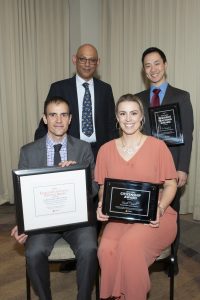The Northern Ontario School of Medicine (NOSM) has recognized two exceptional faculty members at this year’s Doctor of Medicine (MD) convocation ceremonies at Lakehead University in Thunder Bay on May 31 and at Laurentian University in Sudbury on June 4, 2019.
The NOSM Joint and Stipendiary Faculty (JSF) Promotions Committee recommended the title of Associate Professor Honorarius be bestowed upon Dr. Diarmuid (Dermot) McLoughlin of Sioux Lookout and the title of Professor Honorarius be bestowed upon Dr. Hermann Falter of Sudbury.
On Friday, May 31 at Lakehead University in Thunder Bay, Mr. John McLoughlin accepted the award on behalf of his father. McLoughlin was a physician and staff radiologist in Sioux Lookout when he became involved with NOSM in 2003. Originally from Ireland, McLoughlin’s distinguished medical career has spanned over 53 years. McLoughlin served as a Northwestern Ontario Medical Program preceptor and teacher for over 14 years and continued his teaching with NOSM as an Associate Professor. He was an inaugural member of the NOSM Board of Directors and served from 2003 to 2011.
Dr. Hermann Falter was awarded the title Professor Honorarius on Tuesday, June 4 at Laurentian University in Sudbury. Falter, a Professor Emeritus in the Department of Chemistry and Biochemistry at Laurentian University, followed a distinguished career with Laurentian University with major contributions to the development and success of NOSM. He advised the President of Laurentian University on implementing the NOSM organization and subsequently served as a Board member at the School. On three occasions, Falter served as Chief Negotiator for the NOSM faculty collective agreement, all the while serving as a faculty member at the School.
“This year’s Professor Honorarius and Associate Professor Honorarius recipients are being acknowledged for their exceptional contributions to the Northern Ontario School of Medicine,” said Dr. Roger Strasser, NOSM Dean and CEO. “Dr. Hermann Falter and Dr. Dermot McLoughlin have made valuable contributions to teaching, research, and health care across the North.

Pictured, left to right, Dr. Roger Strasser, NOSM Dean and CEO and Mr. John McLoughlin accepting the award on behalf of his father, Dr. Diarmuid (Dermot) McLoughlin.

Pictured, left to right, Steve Paikin, Chancellor, Laurentian University; Dr. Roger Strasser, NOSM Dean and CEO; Dr. Hermann Falter; and, Dr. Pierre Zundel, Interim President and Vice-Chancellor, Laurentian University.



